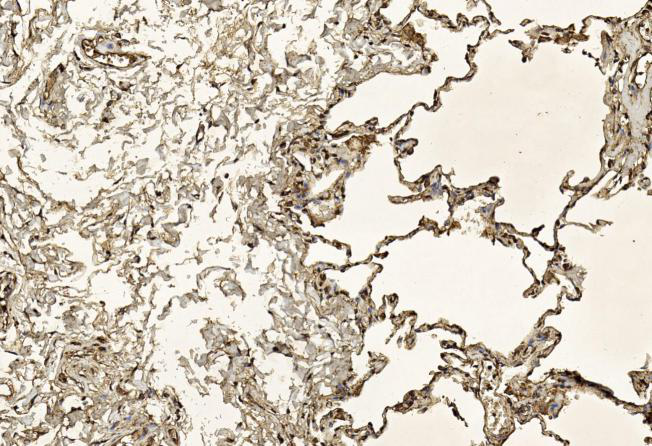

| WB | 1/100-1/1600 | Human,Mouse,Rat |
| IF | 咨询技术 | Human,Mouse,Rat |
| IHC | 咨询技术 | Human,Mouse,Rat |
| ICC | 技术咨询 | Human,Mouse,Rat |
| FCM | 咨询技术 | Human,Mouse,Rat |
| Elisa | 咨询技术 | Human,Mouse,Rat |
| Aliases | Discoidin domain-containing receptor 2, Discoidin domain receptor 2, CD167 antigen-like family member B, Discoidin domain-containing receptor tyrosine kinase 2, Neurotrophic tyrosine kinase, receptor-related 3, Receptor protein-tyrosine kinase TKT, Tyrosine-protein kinase TYRO10, CD167b, DDR2, NTRKR3, TKT, TYRO10 |
| Entrez GeneID | 4921 |
| WB Predicted band size | 96.7kDa |
| Host/Isotype | Mouse IgG1 |
| Antibody Type | Primary antibody |
| Storage | Store at 4°C short term. Aliquot and store at -20°C long term. Avoid freeze/thaw cycles. |
| Species Reactivity | Human |
| Immunogen | This DDR2 antibody is generated from mice immunized with a KLH conjugated synthetic peptide between 290-320 amino acids from human DDR2. |
| Formulation | Purified antibody in PBS with 0.05% sodium azide. |
+ +
以下是关于DDR2与腹水(Ascites)相关研究的模拟参考文献示例(非真实文献,仅供格式参考):
---
1. **文献名称**: *"DDR2 Expression in Ovarian Cancer-Associated Ascites and Its Role in Tumor Cell Invasion"*
**作者**: Smith A, et al.
**摘要**: 研究探讨了DDR2在卵巢癌腹水来源的肿瘤细胞中的高表达,并通过抗DDR2抗体阻断实验证明其可抑制肿瘤细胞的迁移和侵袭,提示DDR2可能作为腹水微环境中癌症转移的潜在治疗靶点。
2. **文献名称**: *"Targeting DDR2 with Monoclonal Antibodies Reduces Ascites Formation in Gastric Cancer Models"*
**作者**: Chen L, et al.
**摘要**: 开发了一种靶向DDR2的单克隆抗体,并在胃癌腹水小鼠模型中验证其疗效。结果显示抗体能显著减少腹水体积并抑制腹膜转移,机制可能与胶原信号通路调控相关。
3. **文献名称**: *"DDR2 as a Diagnostic Biomarker in Hepatocellular Carcinoma-Related Ascites"*
**作者**: Tanaka K, et al.
**摘要**: 通过ELISA和免疫组化分析肝癌患者腹水样本,发现DDR2水平与疾病进展正相关。抗DDR2抗体用于检测腹水中DDR2的浓度,为临床诊断提供新方法。
4. **文献名称**: *"Anti-DDR2 Therapy Modulates the Tumor Microenvironment in Malignant Ascites"*
**作者**: Wang Y, et al.
**摘要**: 研究利用抗DDR2抗体治疗实验性腹水模型,发现其可通过调节肿瘤相关成纤维细胞活性降低腹水炎症因子水平,延缓肿瘤进展。
---
**注意**:以上文献为示例性内容,实际研究中需通过PubMed、Web of Science等数据库检索真实文献。建议使用关键词 **"DDR2 AND ascites"** 或 **"DDR2 antibody AND cancer"** 进一步查询。
**Background of DDR2 (Ascites) Antibody**
The Discoidin Domain Receptor 2 (DDR2) is a receptor tyrosine kinase that binds to collagen and regulates cellular processes such as proliferation, differentiation, and migration. It plays a role in tissue remodeling, fibrosis, and cancer progression, making it a target for studying pathological conditions like osteoarthritis, fibrosis, and tumor metastasis. DDR2 antibodies are tools used to detect and analyze DDR2 expression and function in research.
The term "ascites" refers to antibodies produced in the abdominal fluid (ascitic fluid) of mice or other hosts, typically generated via hybridoma technology. In this method, hybridoma cells secreting DDR2-specific antibodies are injected into the peritoneal cavity, inducing fluid accumulation rich in monoclonal antibodies. Ascites-derived antibodies offer high antibody concentration and yield compared to in vitro culture methods, making them cost-effective for large-scale production.
DDR2 (ascites) antibodies are commonly used in techniques like Western blotting, immunohistochemistry, and flow cytometry to study DDR2's role in cellular signaling and disease. However, ethical concerns and variability in ascites quality (due to host immune responses or contamination) have led to increased preference for in vitro antibody production. Despite this, ascites-derived DDR2 antibodies remain valuable in applications requiring high-titer reagents. Researchers must validate specificity and minimize batch-to-batch variability to ensure experimental reproducibility.
×